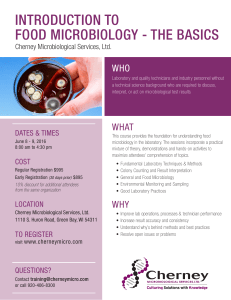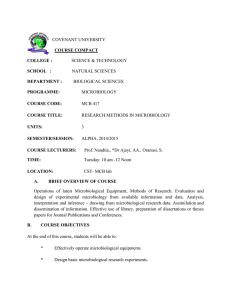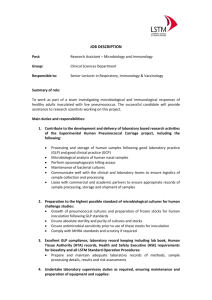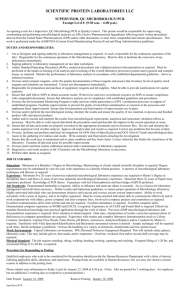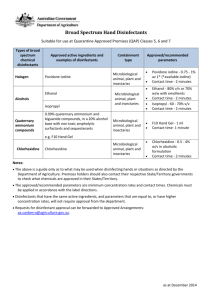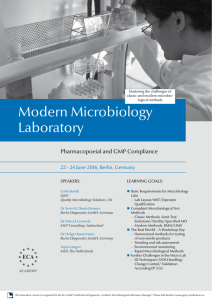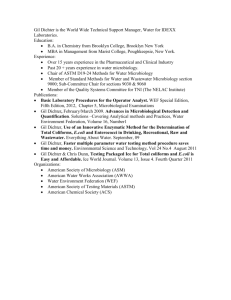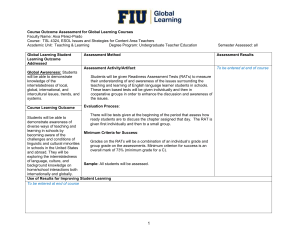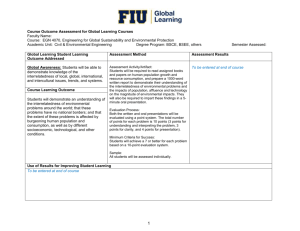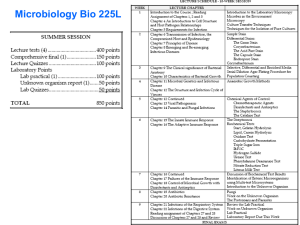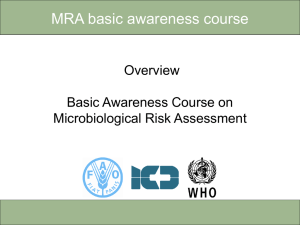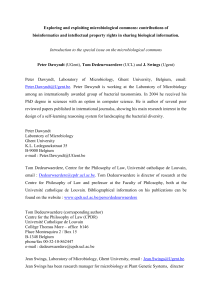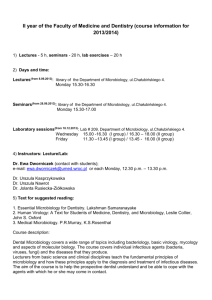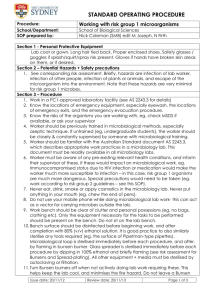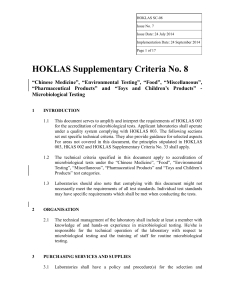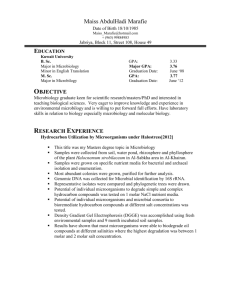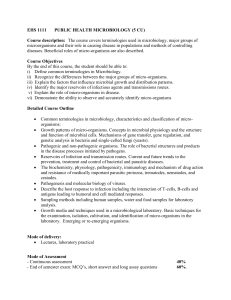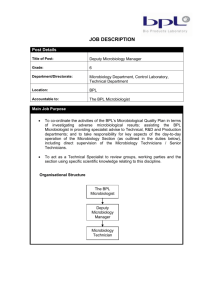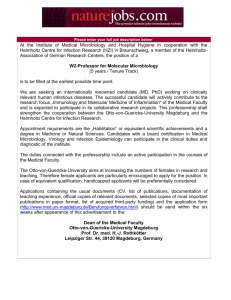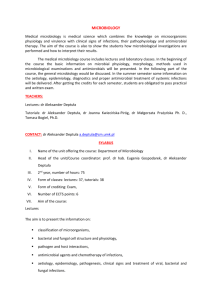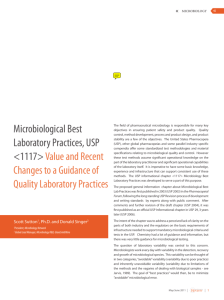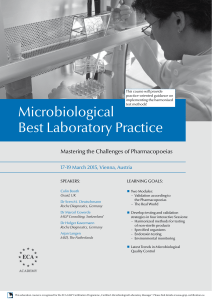Matrix - FIU Global Learning
advertisement
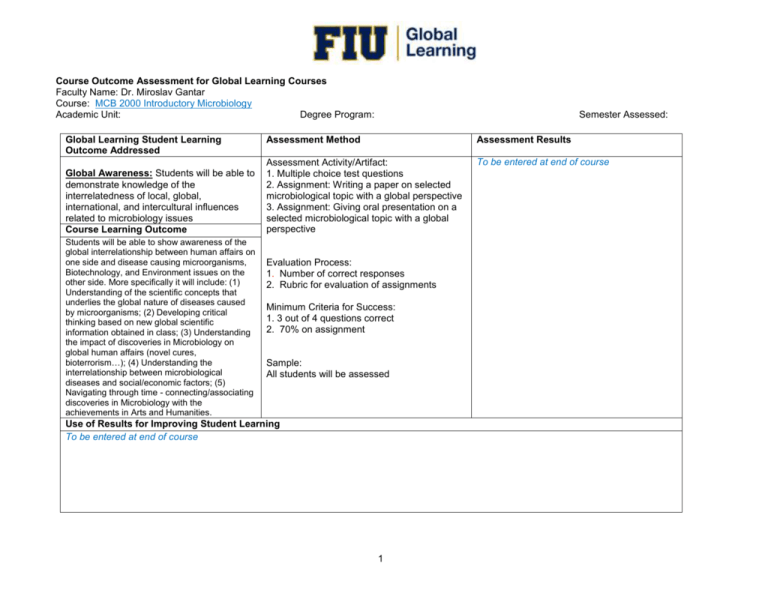
Course Outcome Assessment for Global Learning Courses Faculty Name: Dr. Miroslav Gantar Course: MCB 2000 Introductory Microbiology Academic Unit: Degree Program: Global Learning Student Learning Outcome Addressed Global Awareness: Students will be able to demonstrate knowledge of the interrelatedness of local, global, international, and intercultural influences related to microbiology issues Course Learning Outcome Students will be able to show awareness of the global interrelationship between human affairs on one side and disease causing microorganisms, Biotechnology, and Environment issues on the other side. More specifically it will include: (1) Understanding of the scientific concepts that underlies the global nature of diseases caused by microorganisms; (2) Developing critical thinking based on new global scientific information obtained in class; (3) Understanding the impact of discoveries in Microbiology on global human affairs (novel cures, bioterrorism…); (4) Understanding the interrelationship between microbiological diseases and social/economic factors; (5) Navigating through time - connecting/associating discoveries in Microbiology with the achievements in Arts and Humanities. Semester Assessed: Assessment Method Assessment Results Assessment Activity/Artifact: 1. Multiple choice test questions 2. Assignment: Writing a paper on selected microbiological topic with a global perspective 3. Assignment: Giving oral presentation on a selected microbiological topic with a global perspective To be entered at end of course Evaluation Process: 1. Number of correct responses 2. Rubric for evaluation of assignments Minimum Criteria for Success: 1. 3 out of 4 questions correct 2. 70% on assignment Sample: All students will be assessed Use of Results for Improving Student Learning To be entered at end of course 1 Course Outcome Assessment for Global Learning Courses Faculty Name: Dr. Miroslav Gantar Course: MCB 2000 Introductory Microbiology Academic Unit: Degree Program: Global Learning Student Learning Assessment Method Outcome Addressed Assessment Activity/Artifact: 1. Multiple choice test questions Global Perspective: Students will be able 2. Assignment: Writing a paper on selected to conduct a multi-perspective analysis of microbiological topic local, global, international, and intercultural 3. Assignment: Giving oral presentation on a problems regarding microbiology issues. selected microbiological topic Course Learning Outcome Students will be able to analyze health and Evaluation Process: economic issues related to microbiological situations that occur globally. The global 1. Number of correct responses industrial and agricultural use of microbes 2. Rubric for evaluation of assignments and their effect on social interaction will be analyzed with respect to global economies and pollution. This will include: Minimum Criteria for Success: (1) Comprehension of why microorganisms Minimum Criteria for Success: have a global impact on human affairs 1. 3 out of 4 questions correct (2) Analyze why socio-economic factors 2. 70% on assignment may be responsible for outbreaks of diseases (Example: Outbreak of Cholera in post disaster Haiti) Sample: All students will be assessed Use of Results for Improving Student Learning To be entered at end of course 2 Semester Assessed: Assessment Results To be entered at end of course Course Outcome Assessment for Global Learning Courses Faculty Name: Dr. Miroslav Gantar Course: MCB 2000 Introductory Microbiology Academic Unit: Degree Program: Global Learning Student Learning Assessment Method Outcome Addressed Assessment Activity/Artifact: Global Engagement: Students will be able 1. Multiple choice test questions to demonstrate willingness to engage in 2. Assignment: Writing a paper on selected local, global, international, and intercultural microbiological topic problem solving. 3. Assignment: Giving oral presentation on a selected microbiological topic Course Learning Outcome Students will demonstrate a willingness to engage in disease prevention/intervention to Evaluation Process: 1. Number of correct responses address individual or global health 2. Rubric for evaluation of assignments problems, and other microbiological situations. This will include the development of the following abilities: (1) to analyze students’ own willingness to be involved in problem remediation regarding microbiological situations, and (2) to present their own plan for potential abatement of crisis situations caused by microbiological issues. Minimum Criteria for Success: 1. 3 out of 4 questions correct 2. 70% on assignment Sample: All students will be assessed Use of Results for Improving Student Learning To be entered at end of course 3 Semester Assessed: Assessment Results To be entered at end of course
